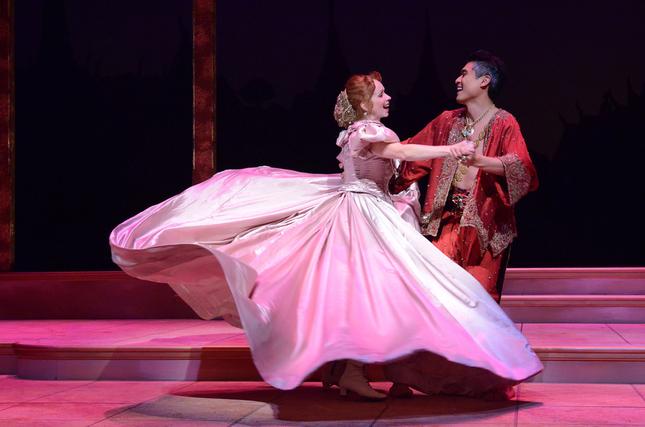Half-Century-Old Classics, ‘Forum’ and ‘The King and I’ Are Acting Frisky
By • December 12, 2013 0 7254

Broadway may be rocking. It might have Spiderman and Cindy Lauper and “Wicked” and “If/Then”, the next perhaps big thing by spring. For sheer entertainment value, however, you cannot beat the comfort zone of a spectacularly well-done production of a golden oldie or what we still think of as the Broadway musical.
Two examples are on display now and worth the bucks and a visit. At the Olney Theatre in Maryland, there’s director Mark Waldrop’s faithful, quite spectacular version of Rodgers and Hammerstein’s “The King and I,” driven by a warm, royal performance by Paolo Montalban. At the Shakespeare Theatre Company’s Harman Hall, there’s Bruce Dow headlining in show-hogging but also show-sharing fashion a rollicking, hells-a-popping production of 1962’s “A Funny Thing Happened on the Way to the Forum,” which is actually a whole bunch of funny things. Both productions feature Broadway musical composers and writers at the top of the form for the genre with with R&H for “The King and I,” and Stephen Sondheim providing the music (including the wowser opener, “Comedy Tonight”) for “Forum.”
Both shows also have stars (Dow and Montalban) who have to overcome the giant shadows cast by the original creators, made larger by movie versions: Zero Mostel, who starred as the Roman slave Pseudolus in both the stage and movie version, and Yul Brynner, who’s gleaming, bald head and charismatic stage presence became almost indelible in the stage version (including a reprisal while he was dying of cancer) and the movie version with Deborah Kerr.
A FUNNY THING HAPPENED ON THE WAY TO THE FORUM
“A Funny Thing Happened on the Way to the Forum,” which comes to us by way of ancient Rome, reminds you mostly of a circus. No, wait, a carnival. Wait, no, it reminds you of a vaudeville show. Better still, a burlesque show. Sometimes, it even seems like an old television variety show, or maybe the tail end of a house party in ancient Rome (or a campus toga party), after Bacchus has been served much too well.
Director Alan Paul is the great, inventive ring master, the barker, the backstage organizer who put this show together, but it’s Bruce Day who does the heavy juggling of its many disparate and, often, desperate parts. “Forum” would not work without Dow as Pseudolus, the slave longing to be free and a citizen of Rome, who goes the extra league and then some to achieve that end. But it would also be impossible to imagine “Forum” without each and every member of the cast , so knit together tightly are the bits, and the fast pace of the laugh-a-second, eye-candy, bawdy, zany show.
Everybody—every character—in “Forum” at one time is somebody else—even the three houses which dominate the set of a block on a street in Rome—are mistaken for the other houses. The only thing you can trust on stages is that something funny and unexpected is about to happen, not always on purpose.
You may or may not have noticed that vaudeville and burlesque haves re-appeared as forms for entertainment around town—here and there in a club, a small theater, a bar—as people seem to have a sudden longing for bad old jokes, performers who can juggle and dance at the same time, singers of the old school and strippers who don’t take everything off.
You can get all of this in “Forum”—the show’s roots are firmly planted on warp-speed comedic lines, some of them nonetheless first heard in Nero’s day, timing cued to slamming doors, panic, and deft, but straight faces that might burst into screaming at any second. It’s like a three-card monte game, a “where’s the pea under the cup” street game, a hustle and a bustle—lots of bustles. In fact everything comes in threes—three houses, three versions of almost every character, and the fact that the courtesan-heroine-ingenue (three again) cannot count past three.
We have not the space or inclination to reprise all the intricacies of plot here—perhaps over drinks some other time. Suffice it to say that slave Pseudolus can gain his freedom from Hero, the clueless scion of his house who has been bowled over Phylia, the winsome, dim, blonde resident at the brothel-house of Lyceus next door. Pseudolus needs to get Phylia for Hero. Trouble is, she’s already been sold to the thunder-thighed Miles Gloriosus, a Roman commander of overweaning self-delight. From this stems every disguise, misstep, lie, double-and-triple crossing, love and death potion and antic in the show. It leaves you kind of breathless.
So does Dow. He has the task of making you feel you’re part of the plot, you’re in the joke, you’re having so much fun that you don’t care if one of the doll babies gets dropped, or a joke falls as flat as a courtesan’s bust, although you can’t tell by the courtesans. Dow is endearing, frisky, seductive, flat out funny, while making Pseudolus a yearning human being, even when he’s out of breath. But he’s not alone: take Hysterium, the aptly named named head slave of the house of Senex and Domin, which sounds like a sex game. Tom Story turns him into a screaming, whiplashed skinny mound of jello trying to keep up with Pseudolus’s plots and also portray a corpse near the climax of the show.
Philia—a virgin who knows how not to seem like one—is an absolute love potion, as portrayed by Lora Lee Gayer. She is deadpan, deft at malapropism and possesses a sleepy, dangerously short but agreeable attention span and a killer voice. She is a gem in a very large ocean of performers.
Let’s not forget the courtesans, announced complete with specialties, reminiscent of the “Gotta Have a Gimmick” strippers in “Gypsy” (now at the Signature), and the wonderful Proteans, who scramble to be soldiers, servants, slaves, cohorts while running and prat-falling and marching. And everyone can sing—best of all Dow with a show-opening that’s a show-stopper—the remarkable “Comedy Tonight.”
You can you top that? How about the lady that opens the second act conducting the orchestra and ends up twirling tassles and not like a cheerleader? Comedy tonight? Hell, yes.
THE KING AND I
“The King and I” has its comedic moments, most of them, oddly, provided by Montalban as the King of Siam, a ruler with a sly, imperious sense of humor as well as sense of entitlement, which he has trouble hanging on to.
If “Forum” predicts Sondheim’s fast-paced runs of music and tunes, if not his seriousness and sophistication of purpose, then “The King and I” epitomizes Rodgers and Hammerstein’s dramatic and purpose-driven theatrical sensibilities, while re-defining and even inventing musicals.
“The King and I” premiered in 1951, while Americans were fighting a war in Korea, still owning bloody memories of its war with Japan, and only less than a decade ahead of entering the fray in Viet Nam, all of them clashes of cultures, among other things. The King of Siam, long in a line of such kings, is fending off western incursions in the 1860s, including cultural ones that challenge notions of kingship, power and slavery. The West is in his palace in the person of Anna, and her son, hired to tutor the many royal children, including the king’s heir. To the king—challenges to his power over his many wives, learning western ways while upholding tradition—it is “a puzzlement,” none less than Anna herself, with whom he struggles, interacts, and has a relationship which ripens into friendship if not romance.
While some of us may be overly familiar with the material, its power has not lost its effectiveness. At Olney, some of that comes from the (as usual) parade of the king’s children, a set that’s entirely Asian, but also pragmatically effective, along with beautiful costume design by Kendra Reign.
While Eileen Ward makes a formidable challenge to the king, she’s also an actress who can bring off classic R&H songs, such as “I Whistle a Happy Tune” and “Hello, Young Lovers.” The highly anticipated “Shall We Dance” number is brought off with swirling charm and energy by Montalban and Ward.
Neither Ward nor Montalban haves the best voice in the cast—that easily belongs to Yoonjeong Seong who can hold a note with passion and then go a little higher than it was written in “We Kiss In a Shadow.”
It’s impossible to compete with the memory of Brynner—and Montalban doesn’t try. He makes the part his own with those touches of humor, a different look to be sure, but a warmth, sometimes displaced by anguish and confusion. He is a very human, often struggling, king—but a king, nonetheless.
Both “Forum” and “King” are classics, which seem—50 and 60 years after their debuts—to be fresh as anything on Broadway stages today.
- Shall We Dance? Paolo Montalban (as the king) and Eileen Ward (as Anna) in Olney Theatre Center’s production of “The King and I.” | Stan Barouh
- Jordan Wright
- Jordan Wright






